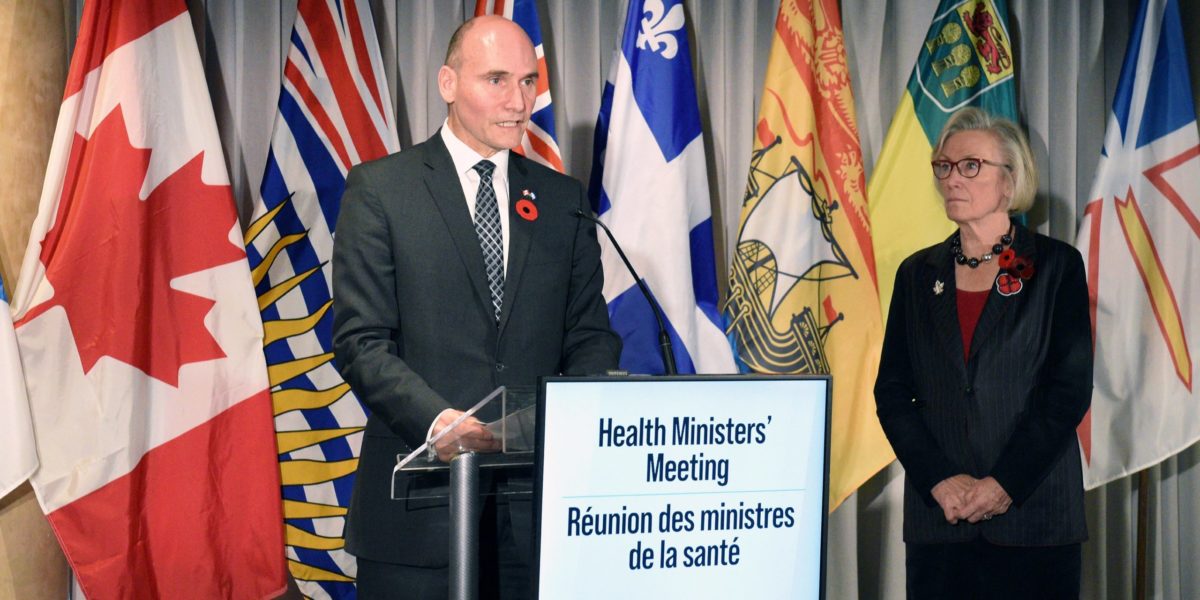It’s a campfire song that repeats itself endlessly. So, too, is the federal/provincial debate over healthcare funding.
Even before they met in Vancouver in early November, the provincial and territorial ministers of health, hosted by the B.C. Minister of Health, made public the reprise of the ditty. Adrian Dix announced, ahead of the start of the first in-person meeting in three years, that the main topic of discussion would be funding. The provinces and territories wanted more money from Ottawa.
Federal Health Minister Jean-Yves Duclos was in Vancouver for two days of discussions with his provincial and territorial counterparts. But before the meetings could conclude, the ministers released a media statement saying that ‘no progress’ had been made.
Days later, when the conference was over, Manitoba Premier Heather Stefanson spoke formally for other premiers and the ministers of health, again saying, “no progress has been made in health-care funding discussions with Ottawa…”
Stefanson repeated the Premiers’ request for a meeting with Prime Minister Justin Trudeau. “Canadians should be able to receive high quality health services now and for the future. It is time for the prime minister to honour his commitment and come to the table,” said the statement.
The federal government promised more money, without specifying the amount. What they made clear was that the provinces and territories would have to agree to measure and then share outcomes to determine the effects of the extra funds. The provinces and territories were not pleased with this requirement.
The Canada Health Act (CHA) is the basis of the funding arrangements. The Act sets out the primary objective of Canadian health care policy, which is “to protect, promote and restore the physical and mental well-being of residents of Canada and to facilitate reasonable access to health services without financial or other barriers.”
The CHA establishes criteria and conditions related to insured health services and extended health care services. The provinces and territories must fulfill these to receive the full federal cash contribution under the Canada Health Transfer (CHT).
This requirement is not new. In 2000, the Canadian Institute for Health Research (CIHR) was founded. It was the first of many groups tasked with tracking both Canada’s progress in health status and Canada’s accomplishment of the many recommendations from previous reports.
CIHR has since been joined by the Health Council of Canada, the Canadian Patient Safety Institute, the Public Health Agency of Canada, and formal groups on Wait Times, Mental Health and The Canadian Partnership Against Cancer.
The current stand-off between the Premiers and the federal government seems to ignore the role of the organizations established to track health outcomes relative to healthcare funding. The Premiers even seem to ignore the very existence of these organizations and the reason for their having been established in the first place.
If the Premiers feel unjustified in their request for strings-free funding, they might reflect on the position of the World Health Organization, (WHO) on primary health care:
“All people, everywhere, have the right to achieve the highest attainable level of health. This is the fundamental premise of primary health care (PHC).
“Primary health care is a whole-of-society approach to effectively organize and strengthen national health systems to bring services for health and wellbeing closer to communities It has 3 components:
- integrated health services to meet people’s health needs throughout their lives
- addressing the broader determinants of health through multisectoral policy and action
- empowering individuals, families and communities to take charge of their own health.
“Primary health care enables health systems to support a person’s health needs – from health promotion to disease prevention, treatment, rehabilitation, palliative care and more. This strategy also ensures that health care is delivered in a way that is centred on people’s needs and respects their preferences.
“Primary health care is widely regarded as the most inclusive, equitable and cost-effective way to achieve universal health coverage (emphasis mine). It is also key to strengthening the resilience of health systems to prepare for, respond to and recover from shocks and crises.”
Compare this to the Canada Health Act’s primary objective, “to protect, promote and restore the physical and mental well-being of residents of Canada and to facilitate reasonable access to health services without financial or other barriers.”
A quick read raises the question of whether Canada’s approach agrees or disagrees with WHO’s.
Overall, the emphasis on primary care is not a priority for Canada. Despite many Royal Commissions, nation-wide studies, province-wide studies and healthcare surveys, primary care is given little priority in Canada. Why? Because the CHA funds doctors’ visits (when primary care doctors are available, which is not the case for some five million Canadians) and doctors’ visits are intended and funded to deal with sick patients. Funding to keep people healthy is scarce.
Doctors’ visits are one of two government-insured services that must be covered by the provinces and territories. The other is hospital admissions in ward-based accommodations. We have a sickness insurance system, not a healthcare system.
The proportion of funding spent on prevention and home-based/community-based services is very small. These services, in addition to mental health, rehabilitation, chronic care, drug addiction treatments, geriatric care and congregate living, among others, are the poor relatives of doctors and hospitals when it comes to funding.
Until all levels of government identify that keeping Canadians healthy is the main priority of the national and provincial/territorial insurance schemes, very little can change. As the population grows and ages, the reliance on funding to “fix” people’s health will only grow. If history is an indication of the future, the funds to keep people healthy will decrease even more.
What will it take to transform Canada’s sickness insurance to healthcare insurance? First and foremost, perhaps the Premiers should choose a different tune.



